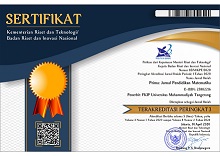Development of Mathematics Learning E-Modules with the PQ4R Strategy to Improve Students' Creative Thinking Abilities and Learning Independence
Abstract
This research aims to analyze: 1) the validity, practicality and effectiveness of e-modules with the PQ4R strategy developed to increase students' creative thinking abilities and learning independence; 2) increasing students' creative thinking abilities through e-modules with the developed PQ4R strategy; 3) increasing students' learning independence through e-modules with the developed PQ4R strategy. This research is development research using the ADDIE development model. This development model consists of 5 development stages, namely Analyze, Define, Development, Implementation and Evaluation. From the results of trial I and trial II it was obtained: 1) E-module with the PQ4R strategy which was developed to increase students' creative thinking abilities and learning independence, has met the criteria of being valid, practical and effective; 2) Increasing the ability to think creatively using e-modules with the PQ4R strategy that has been developed as seen from the N-gain value in trial I of 0.36, increasing to 0.40 in trial II, meaning it is in the "medium" category; and 3) Increasing students' learning independence using e-modules with the PQ4R strategy that has been developed as seen from the N-gain value in trial I of 0.21, increasing to 0.32 in trial II, meaning it is in the "medium" category.
Keywords
Full Text:
PDFReferences
Akbar, S. (2013). Instrumen Perangkat Pembelajaran. Bandung: Rosdakarya
Arikunto,S. 2012. Dasar-dasar Evaluasi Pendidikan Edisi 2. Jakarta : PT Bumi Aksara.
Bloom & Benjamin S. (1956). Taxonomy of Educational Objectives : The Classification of Educational Goals, Handbook I Cognitive Domain. New York : Longmans, Green and Co
Harriman. (2017). Berpikir Kreatif. Journal of Chemical Information and Modeling 53(9):1689–99.
Hasanah, M. & E. Surya. 2017. Differences in the Abilities of Creative Thinking and Problem Solving of Students in Mathematics by Using Cooperative Learning and Learning of Problem Solving. International Journal of Sciences: Basic and Applied Research (IJSBAR), 34(1).
Munandar, U. (1999). Pengembangan Kreativitas Anak Berbakat. Jakarta: Rineka Cipta.
Thoha., C. (1993). Ciri-ciri kemandirian belajar [online]. (http://tugasavan.blogspot.com/2010/10/kemandirian.html, diakses tanggal 25 Februari 2013).
DOI: http://dx.doi.org/10.31000/prima.v8i3.11862
Article Metrics
Abstract - 358 PDF - 365Refbacks
- There are currently no refbacks.
Prima: Jurnal Pendidikan Matematika
Program Studi Pendidikan Matematika
Fakultas Keguruan dan Ilmu Pendidikan
Universitas Muhammadiyah Tangerang
Jl. Perintis Kemerdekaan I/33, Cikokol
Kota Tangerang, Indonesia
e-mail: primajpm@gmail.com
Prima: Jurnal Pendidikan Matematika (p-ISSN: 2579-9827 | e-ISSN: 2580-2216) is licensed under a Creative Commons Attribution 4.0 International License.







